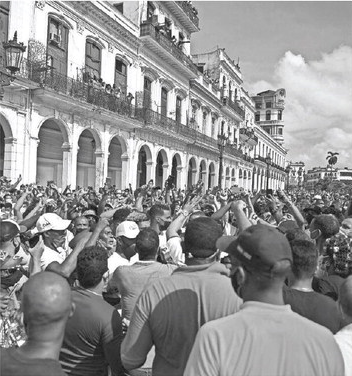Cuba’s criticism of US doesn’t tell whole story

People take part in a demonstration against the government of Cuban President Miguel Diaz-Canel in Havana on July 11. Yamil Lage/AFP/Getty Images/TNS
Embargo isn’t cause of all domestic problems
Nora Gamez Torres Miami Herald TRIBUNE NEWS SERVICE
On the evening of Aug. 6, 1994, Fidel Castro appeared on state television after a rare anti-government protest erupted in Havana. The country was going through the worst of the severe economic crisis that followed the end of subsidies from the collapsed Soviet Union. He asked the population to tolerate all kinds of scarcities in the name of the revolution while he resisted desperately needed economic reforms. That night he had a two-word response to the question, ‘What do you believe is the fundamental reason behind the recent events?’
His answer: ‘El bloqueo.’ The blockade – the Cuban phrase for the U.S. economic embargo.
Twenty-seven years later, Castro is gone, the economy is again in shambles and, unsurprisingly, the Cuban government once again blames the U.S. embargo for the recent widespread protests that shook the island. It is a strategy that Cubans know well. For decades, the government has blamed most of its own shortcomings on what it calls the ‘murderous criminal blockade’ – everything from lack of food to lack of furniture in libraries to lack of insulin for diabetics.
The embargo has been used time and again by the Cuban government to obscure what Cubans on the island, in turn, call ‘the internal blockade’ – the economic and political restrictions imposed by the Communist Party with the support of an extensive military and security apparatus.
After the July11 demonstrations, pro-government activists and leftist organizations like Black Lives Matter have amplified the Cuban government’s claim that the U.S. embargo is the sole or primary cause of the street demonstrations. Latin American leftist governments like Mexico and Bolivia joined the denunciations and sent humanitarian aid to the island.
But the reality is that while the embargo does have some effect on the island’s economy and the population, it is not the principal reason the country’s economy is in tatters nor the reason Cubans took to the streets. They were, by their own accounts, fed up with the lack of food, the electrical blackouts and ‘the misery’ in general, and they called for ‘a change of system.’ It was the failure of Cuba’s centralized socialist economy, decades of government mismanagement and the lack of civil and political liberties that pushed thousands across the island to call for ‘the end of the dictatorship’ and ‘freedom.’
While unprecedented, the protests were not entirely surprising, since the life of ordinary Cubans has significantly deteriorated after top leader Miguel Diaz-Canel was handpicked by Raul Castro to become his successor.
‘There were clear signs of a growing social unrest, and the policy responses of the Cuban elites to the growing inequality were regressive. The protests were also a cry of the Cuban families that have to put up with so much scarcity,’ said sociologist Elaine Acosta, a research fellow at the Cuban Research Institute at Florida International University.
The country was already in recession when the coronavirus pandemic hit and plunged the economy into its worst contraction since the so-called ‘Special Period’ in the 1990s after the end of Soviet subsidies. Dwindling aid from Venezuela and sanctions by the Trump administration to deprive the Cuban regime of revenue linked to remittances, travel and tourism also contributed to the economic crisis.
But what makes Cuba’s economy so sensitive to financial and political decisions made overseas is its own chronic lack of productivity.
After six decades of socialist centralization, the country still does not produce enough to feed its population. Farmers cannot freely cultivate and sell their crops. Its fishing fleets – and individual fishermen – are not allowed to sell fish, as the Center for a Free Cuba recently reminded readers in its response to a paid advertisement that appeared in The New York Times with the title ‘Let Cuba Live!’ The Center titled its retort: ‘Let Cubans fish!’
The government has resisted liberalizing the economy even as most economic indicators, including industrial and agricultural production and the sugar harvest, Cuba’s prime export for centuries, plummeted. Instead, the government tightened its grip on freedom of expression through new decrees and took drastic measures to cut spending: It eliminated food subsidies, reduced the social assistance network and cut the public health system’s budget. It also slashed imports, leading to shortages of food, medicines and other basic needs.
One thing was clear in the hundreds of videos that surfaced on social media of the massive anti-government uprising on the island: Not a single one showed anyone protesting against the embargo. The wrath of the protesters was aimed at the regime itself and its leaders, particularly Diaz-Canel.
‘I did not hear anyone marching to remove the embargo. They were asking for freedom,’ independent journalist and longtime dissident Miriam Celaya said in a phone interview from Havana. A supporter of Cuba’s engagement with the U.S., she sat next to former President Barack Obama during his historic meeting with Cuban dissidents in Havana in 2015.
‘Historically, I have spoken out against the embargo and against its being used to cover up all the human rights abuses,’ she said. ‘To link the embargo to the protests seems to me to be tremendous opportunism.’
It is not that Cubans do not acknowledge that the embargo makes things more difficult for the Cuban government, and hence for them too, as the state owns and manages all food stores, hospitals, schools and many other services such as electricity and water. But they criticize how Cuban leaders have used it as a scapegoat for everything that goes wrong on the island.
‘The embargo is real, but the regime has used it so vaguely to justify almost all problems in Cuba that it has rendered it meaningless,’ tweeted young Cuban actor Daniel Triana.
The embargo has little to do with how the Communist Party chooses to run the island’s centralized economy or why it curtails the rights of its citizens. And some of the claims made by the Cuban government and its defenders – for example, that Cuba can’t buy food or medicines from U.S. companies – are simply not true.
The six-decade-old policy does restrict some U.S. trade, travel and financial transactions with Cuba. It is not designed to last forever: The president of the United States can lift it when a democratic government is elected on the island.
As a general rule, the embargo prohibits all U.S. transactions involving the Cuban government or persons living in Cuba, unless explicitly authorized by the U.S. Treasury Department regulations or by law. Cuba is banned from using the U.S. financial system, and there are currently no direct banking relations between the two countries. Other restrictions make it more difficult for the island to acquire goods overseas that have more than 10% American-made components.
But the embargo does not prevent Cuba from trading with other countries, and just like Americans, Cubans could buy South Korean Samsung TVs or Japanese Toyotas – but the prices in the government stores are well beyond the average worker’s reach, which has nothing to do with the embargo. The TV goes for $1,139 and the car for $80,000, while the country’s monthly minimum state wage is the equivalent of $88.
Because of the importance of the U.S. financial system globally, restrictions on transactions with Cuba may also affect foreign companies. Some companies simply choose not to trade with Cuba, fearing running afoul of U.S. law. But at the same time, the embargo has been compared to a block of Swiss cheese because of its many holes.
Contrary to Cuban government propaganda, there is no ban on selling food and medicines or telecommunication services to Cuba. In fact, most of the chicken that Cubans eat, for example, comes from the United States.
The embargo does require Cuba to pay upfront for food, without financing from U.S. companies. The requirement, however, hasn’t prevented Cuba from buying millions of dollars’ worth of food from the U.S. every year. In 2020, Cuba bought $157million in chicken, grains and even toilet paper, and the U.S. ranked third as the island’s trading partner for agricultural imports, just below the European Union and Brazil and well ahead of China, according to a May report by the Congressional Research Service.
The embargo regulations also authorize transactions related to humanitarian needs or designed to directly benefit the Cuban people, such as medical and health-related projects, disaster preparedness, or environmental concerns, among others. American companies are also allowed to help improve Cuba’s crumbled infrastructure in key areas such as public transportation, water management, public housing, health and education, but these are not opportunities that the island’s government makes public.
Americans can donate food, medicines and medical supplies, communication devices and other items to people on the island, but it is not a straightforward process. The communist government has the last word about what actually gets into the country and usually blocks aid sent by the U.S. government or Cuban exiles. And on the U.S. side, organizations and activists who send aid to Cuba complain about the ‘red tape’ and lack of clear guidance.
The embargo allows the export of U.S. medicines and medical supplies to the island, but the process can be cumbersome, requiring licenses and guarantees that they will go to the Cuban people, not the government.
That might explain why, since 2003, the Cuban government has bought the relatively small sum of $26.3million in American health care products including insulin, penicillin, laboratory reagents, ultrasonic scanning equipment, artificial limbs and other medical appliances, according to data gathered by the U.S.-Cuba Trade and Economic Council.
While selling or donating medical supplies is possible, several organizations, including the Cuba Study Group and the Center for Democracy in the Americas, are asking the Biden administration to suspend the bureaucratic requirements to speed up the process citing the humanitarian emergency caused by the coronavirus pandemic in Cuba.
The Cuban government has recently complained that U.S. sanctions have made it difficult to buy syringes for its vaccination campaign. But it’s hard to pinpoint exactly whether the main problem is the embargo or simply market forces and Cuba’s unwillingness to pay higher prices or find sources of credit.
Cuba did eventually receive 1.7million syringes donated through New York-based Global Health Partners, which coordinated a campaign to raise funds to send at least 6million syringes to the island. According to executive director Bob Schwartz, the U.S. sanctions created difficulties in obtaining syringes and in finding a shipping company willing to deliver them.
But market forces and a lack of supply worldwide also played a part in the island’s syringe troubles. That led manufacturers to favor orders from larger countries that are not under any U.S.-imposed restrictions, said Medea Benjamin, co-founder of CODEPINK, a leftist organization that has supported the Cuban government over the years and also coordinated the campaign Let Cuba Live!
‘Demand was so great that manufacturers didn’t want to bother with a relatively small order for Cuba in addition to having to navigate the banking system and facing the risk of retaliation by the U.S.,’ she said.
The complexity of embargo regulations makes it difficult to separate fact from propaganda, and the policy debate is filled with half-truths.
Some of the claims made by the Cuban government about the effects of the embargo over the years are based on reality – for example, that the sanctions have prevented Cuba from acquiring new jetliners. But other claims are based on dubious calculations on how much money Cuba would have saved if it could trade freely with the U.S. A third class of claims is based on fictitious calculations of ‘losses’ because Cuba cannot sell its products like organic produce or software in the U.S. Many other claims are manipulations of the facts or outright falsehoods, like saying the embargo does not allow the country to buy grain seeds in the U.S. It does, and Cuba has purchased them over the years.
Ultimately, the island’s government has successfully managed to find ways around the embargo and buy American goods, skirting the financial restrictions, by building an extensive web of offshore companies in Panama, Luxembourg and Liechtenstein, as investigations by the Miami Herald and McClatchy have uncovered.
On the island, the embargo is not a popular policy. It has not led to a democratic transition. Many Cubans want it lifted because it would deprive the government of its favorite excuse for shortages of everything. Others say it makes things worse for ordinary Cubans, since the government, which owns and administers almost everything from stores to hospitals, passes its costs to the population while maintaining intact the political and military structures that keep the regime in place.
In the U.S., the recent Cuban protests have brought the policy debate about the embargo to the forefront again. A recent national poll by Echelon Insights shows that Americans do not believe the embargo is the main reason behind the demonstrations. But pro-engagement activists are using the events to call on President Joe Biden to lift all sanctions. They cite the ongoing humanitarian crisis aggravated by the COVID-19 pandemic. They also argue that sanctions make it more difficult to empower Cubans on the island so they become independent from the state.
But many Cubans on the island and Cuban Americans in the U.S. are conflicted over how the embargo debate is taking attention away from the situation on the island and helping the communist regime to deflect responsibility.
‘You keep bringing the embargo in. We could have talked about the embargo last week, last month. I agree with you, the embargo makes no sense, it needs to end,’ said Miami Cuban American Elina Barredo in a video posted on social media.
‘But that’s the same narrative oppressors are using there. They blame everything on the embargo. Stop bringing the embargo up.’
Blaming the protests on the embargo is a ‘simplification and a politicized answer that denies agency to the Cubans on the island,’ said Acosta, the sociologist.
‘The embargo has been in place for 60 years, and the Cuban elites did little to ameliorate it, instead delaying or backtracking on the measures that could help to diminish its impact,’ she said.
‘They have significant responsibility for the current structural crisis of the Cuban society.’
‘This is not about the embargo,’ Acosta said. ‘This is about the exhaustion of a 62-year-old model.’









